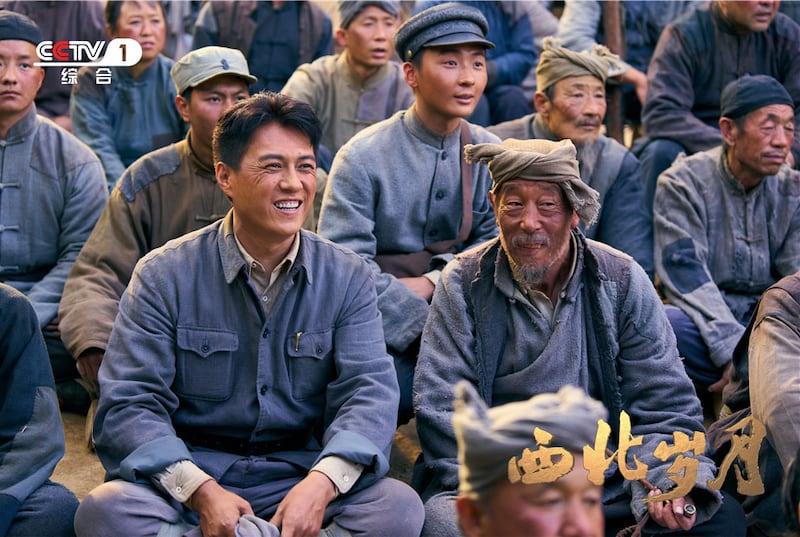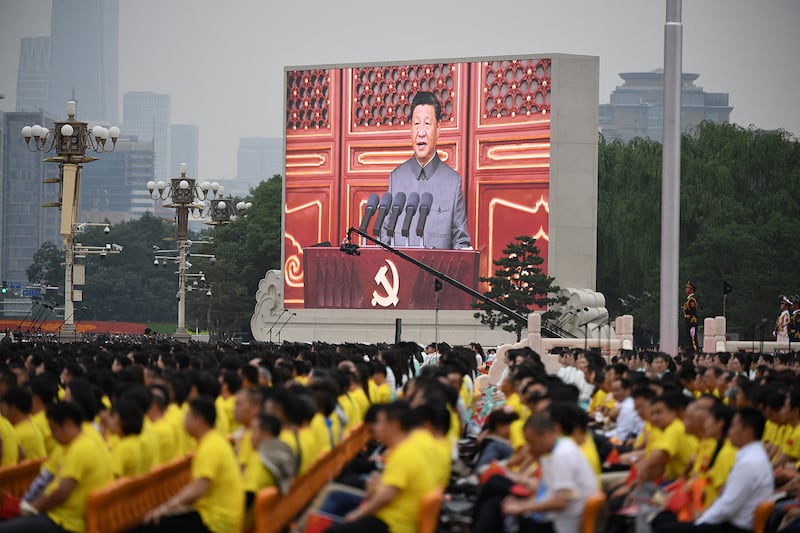Qian Lang for RFA Mandarin2024.11.10
China’s state broadcaster has launched a historical TV show with an all-star cast dramatizing the role of President Xi Jinping’s father Xi Zhongxun in the communist revolution, although social media reaction and commentators suggest that young people in China would rather watch “Stranger Things.”
“When the wind blew from the northwest, the revolutionaries … watered their faith with their own blood and lived their lives in hope,” state broadcaster CCTV said in a Weibo post announcing the launch of the 39-episode TV series with a short trailer on Nov. 5.
“I’m Xi Zhongxun,” whispers a youthful version of the revolutionary veteran over footage of idealistic young men saluting the communist flag and charging into battle.
“I will forever fight for the struggling masses with all my might,” he pledges over full-costume footage of historic battles amid the yellow dust of northwest China, with red flags appearing in nearly every shot.
“I make revolution with the Communist Party because it’s through them that I saw the light of truth, and was given something to fight for,” the character says.
Later, the narrator intones: “Xi Zhongxun, a leader of the people who came from the people,” followed by a shot in which the elder Xi plays with his young son, Xi Jinping, driving home a political point about the current Chinese leader’s lineage.
Personality cult
The show comes amid growing signs of a Mao-style personality cult around Xi, as institutions and political figures compete to show the utmost loyalty to Xi and his personal brand of political ideology, including via propaganda movies and TV shows.
The latest show, titled “The Northwest Years,” tells the story of the elder Xi’s role as a young man in the war against the Japanese in the country’s northwest, defending China’s borders and promoting land reforms to free farming communities from the yoke of local landlords.

With a star-studded cast playing young and good-looking versions of revolutionary cadres and military commanders like Xi Zhongxun, Liu Zhidan and Xie Zichang, the show’s action focuses on the Shaanxi-Gansu-Ningxia Revolutionary Base. Leaders Mao Zedong, Zhou Enlai, Liu Shaoqi, and generals Zhu De and Peng Dehuai also make an appearance.
Directed by Dong Yachun and starring actors Jin Dong, Yu Hewei, Ding Yongdai, Wu Lei, and Ni Ni, the show is clearly a big-budget production that’s hoping to reach a wide audience across China.
Yet comments on the show were largely very similar and repeated the slogans in the original post, with users repeatedly commenting “keep the faith” and “live in hope” under the Weibo post.
By contrast, Weibo users got into a somewhat livelier discussion under a newly released trailer for Season 5 of Netflix retro supernatural drama Stranger Things, which is scheduled for release next year.
“Is it finally coming?” user @ARTISTVW commented from the northern province of Shaanxi, while @Macabre-Chi thought it “looks good.”
“It is good,” wrote @Nutwo-1-1, adding: “Stick with it and you’ll soon be hooked.”
“Haven’t you seen it?” commented @-Freedom-to-go-crazy from the southwestern province of Sichuan. “It’s very good.”
“The plotting is very tight, and there are no boring moments,” @blue2w added from neighboring Yunnan province. “It’s full of intelligence and doesn’t treat the audience like fools.”
While Netflix isn‘t officially available in China, viewers behind the Great Firewall can still find ways to binge the Duffer Brothers’ 1980s nostalgia-fest, including using circumvention tools like VPNs or BitTorrent, according to media reports from 2019, when Season 3 was released.
Preference for US shows
A Chinese journalist and critic who gave only the surname Gao for fear of reprisals said many young people in China prefer to watch American TV shows, which can still be accessed via circumvention tools.
“U.S. TV series like ‘Perry Mason,’ ‘Game of Thrones’ and ‘Stranger Things\’ are hugely popular in China,” he said. “They are downloaded hundreds of thousands or even millions of times, according to my knowledge.”
He said most people wouldn’t bother with revolutionary period dramas like “The Northwest Years” unless forced to watch them by their bosses or local party committee as part of a political study task at work or in school.

“Nobody’s going to watch this kind of show unless they have to,” Gao said, adding that the role played by Xi Zhongxun in the 1969 Ninth Party Congress headed by late supreme leader Mao Zedong had been hugely inflated.
“Xi Zhongxun was very low-ranking at the time of the Ninth National Congress of the Chinese Communist Party, and played a very small role only,” he said. “I saw a scene showing him raising the curtain for Mao Zedong … which I think is a bit over the top.”
But he said audiences were still unlikely to be impressed, despite the lavish costume and set design.
“People are no longer interested in these dramas, which have nothing to do with the lives of ordinary people,” he told RFA Mandarin in a recent interview.
He said such shows no longer have the captive audiences via free-to-air state broadcasters that they used to enjoy, as people can now go online for their entertainment.
A resident of the northern province of Shaanxi who gave only the surname Li for fear of reprisals said Xi Zhongxun was more of a political than a military leader.
“Xi Zhongxun’s most important political achievement was to instigate the Hengshan Uprising, which was a rebellion of two divisions of the National Revolutionary Army stationed in Yulin, in all about 5,000 to 6,000 people,” Li said.
“This uprising cleared the obstacles for the Yan’an troops to move northward and ensured the safety of Mao Zedong’s troops based in Yan’an,” he said.
Translated by Luisetta Mudie. Edited by Malcolm Foster.

